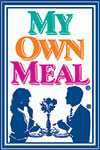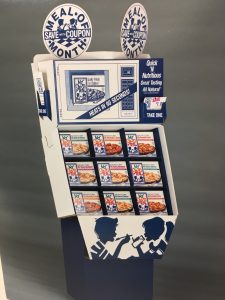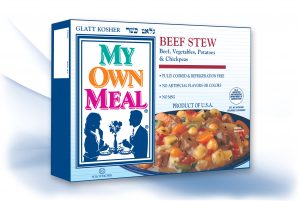Can Packaged Food have both Kosher Certification and Halal Certification?
We pose the question; Can one prepared meal be both kosher certified and halal certified?
The simple answer is sometimes, but nothing is as simple as it seems, and that cannot be truer than with the strict kosher certification of food products and prepared meals.
Let’s break it down and see what can be done and what should not be done.
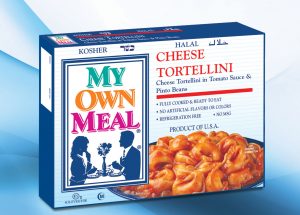 |
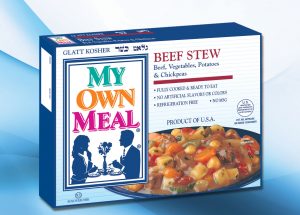 |
Non-Meat Meals: Dual Halal and Kosher Certification Is Not New
Since the early 1990’s, My Own Meals has been successfully marketing and supplying dual certified, non-meat meals to consumers, relief agencies, governments, militaries, and institutions. Our dual certified (meaning both halal and kosher certification), non-meat meals helped many of these institutions and agencies control costs and reduce inventory items. Dual certified non-meat meals reduced SKUs and encouraged institutions to develop religious meals programs that they might otherwise not have implemented.
Consumers and institutions accept and understand that both Jewish and Muslim supervisors work side-by-side in the factory supervising non-meat production, qualifying both symbols to appear on the package. Even though dairy meals are more complicated than pareve meals because of cheese, yogurt, and other dairy ingredients.
√ So, yes, non-meat meals (dairy and pareve) can qualify to be dual certified and accepted by consumers.
A few marketers and religious certifying bodies are testing the waters by trying to dual certify MEAT and POULTRY meals.
But Can Two People Slaughter at the Same Time for Dual Kosher and Halal Certification?
The seemingly obvious and simple answer here is NO.
Depending upon the certifiers, was the meat or poultry ingredient slaughtered by a:
- Muslim under Jewish supervision and approval?
- Christian who is approved by both the kosher and the halal certifiers?
- Jew under Muslim supervision and approval?
Hmmm. These are reasonable questions, right? The point is that we just do not know.
Yes, some Muslims may accept and buy kosher-certified meat as a substitute for halal slaughter. In this case, the Muslim consumer does not expect or need a halal symbol on the package for them to purchase.
Additionally, some non-Orthodox Jews believe halal is better than kosher because Muslims, unlike Jews for kosher slaughter, bless each animal individually. They may or may not then soak and salt at home. Yet they would buy a halal certified meat meal with just a halal certification.
And some cost-minded people from both religions expressly stated that they do not like the price for the meal to include the fees of redundant and expensive slaughtermen.
Result – Consumer Confusion: The Risk to Marketers and Certifiers
Jewish proponents of dual-certified meat meals suggested that we should assume a Jew slaughtered the meat ingredient and the Muslim agency accepted it as halal-equivalent. Thus, it is acceptable to kosher consumers. Really? What message are the marketers and their kosher and halal certifiers trying to convey about the meat to consumers? Would a strictly observant kosher consumer be willing to take this risk no matter what rabbinical symbol is on the package?
Or will they react as the administrator of our rabbinate, Rabbi Soloveichik, responds to seemingly all our questions and those of the mashgiachem by stating; How do you know?
In the case of dual-certified meat and poultry meals, how do we know who actually performs the slaughter? What controls assure that the meat/poultry ingredient is either kosher or halal certified? Once we know this, then what standards are used to further certify the meat as also accepted by the other certifying agency? In the end, are we comfortable with these answers?
This all seems to be a lot of confusion created for little, if any, benefit. Or worse, it creates doubt and questions which may lead to a strong negative consumer backlash to both the marketer and the certifiers.
Two Possible Resolutions: Truth in Marketing Disclosure or Continued Unique Kosher Certification
For clarity, perhaps marketers should identify which religion actually performed the slaughter of the meat/poultry ingredient used in the meal. This information could be printed under the religious certifiers’ symbols on the package. Then the purchaser knows whether the meal has a halal certified or kosher certified meat or poultry ingredient.
Or perhaps better yet, we just uniquely kosher certify OR halal certify meat and poultry meals as consumers expect.
As a diligent kosher consumer, think about which resolution you would prefer:
- Should marketers simply disclose which religion actually performed the slaughter of the meat/poultry ingredient immediately next to the certification symbols on the package?
- Or is it better to continue to separately certify kosher slaughter and processing as kosher, and halal slaughter as halal?
Be sure to let your rabbinate know your thoughts and opinions as marketers and kosher agencies begin to test the reaction of kosher consumers of prepared meals.
We believe that the effort to dual certify meat and poultry meals will negatively affect consumer confidence in both the certifying agency and the brand. What will happen to the reputations of brand, and the kosher and halal agencies supporting this process? You decide.
